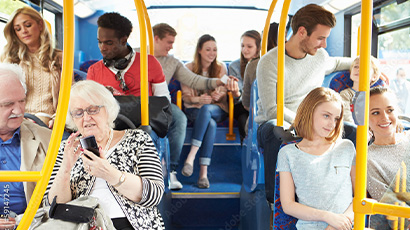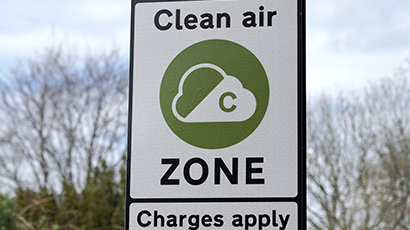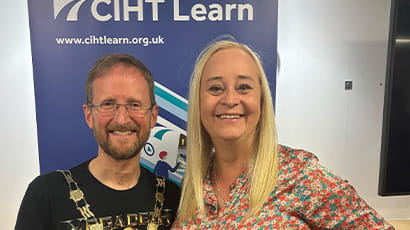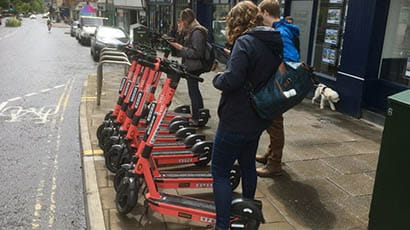Academics play role in public trial of driverless pods at Queen Elizabeth Olympic Park

Driverless pods transported members of the public around London's Queen Elizabeth Olympic Park, with visitors able to test out an innovative mobility service.
The trial was part of a research project involving UWE Bristol robotics and transport experts that will pave the way for the use of connected and autonomous vehicle (CAV) transport services at public transport hubs and around private estates, including tourist and shopping centres, hospitals, business parks and airports.
The AECOM-led Capri consortium ran the trial, which saw two British made pods autonomously operating at the park. Visitors were able to book a ride using an app through information marshals located at different stops along the pods' route. When booking their journey, participants chose which stop they wanted to be picked up and dropped off at, with the system giving destination instructions to the self-driving vehicles. Simulating an on-demand service, the trial supported the wider rollout of driverless shuttles in the future.
With Queen Elizabeth Olympic Park already a testbed for smart mobility activity, alongside a wide range of other innovation projects, an important element of this trial assessed people's behaviours and attitudes towards driverless pods. With little existing research on how people interact with CAVs in public spaces, representatives from UWE Bristol and Loughborough University observed how people behaved when confronted by the pods, as well as surveying passengers who took a ride on them.
Conducting the trial in the park allowed the UWE Bristol team to speak to users of the park to explore how they felt about the pods being in the same space, and if that raised concerns. Talking to groups such as cyclists, e-scooter users and families provided feedback on how accepting the public might be of driverless vehicles in off-road spaces like the park, and in other locations such as shopping centres, hospitals or airports.
Ian Shergold, a research fellow in UWE Bristol's Centre for Transport and Society, said: “The trial in the Queen Elizabeth Olympic Park provided a great opportunity to run autonomous pods in a real-life setting, and see how other users of the space react to them. The data collected will help further refine the vehicles themselves in respect of how they interact at close range with pedestrians and cyclists, and helps project partners better understand how and where pod services might be deployed.”
Focusing on trips of up to five miles to connect people to places, Capri is developing the next generation of autonomous pods, as well as the systems and technologies that will allow the vehicles to navigate safely and seamlessly in both pedestrian and road environments. A key aim of the project is to develop a business model blueprint to help site owners of large and diverse estates like Queen Elizabeth Olympic Park assess whether driverless shuttles will be viable at their site and how best to invest in this emerging technology.
The trial at Queen Elizabeth Olympic Park earlier this month was the first public appearance for the Capri pods, which picked up and dropped off passengers at a number of points on a circular route. The Capri pods will be at The Mall in South Gloucestershire in early 2020, returning to the park next year with a final trial that will extend their route and further test the on-demand technology.
Related news

09 June 2025
Opinion: If you want trams, support the buses
Graham Parkhurst, Professor of Sustainability, Centre for Transport and Society, reacts to news of £800 million investment in the region's transport network.

29 November 2024
Bristol Clean Air Zone – two years on, what is the future of the CAZ?
Two years on, Professor Graham Parkhurst and Professor Jo Barnes comment on what the future of Bristol's Clean Air Zone looks like.

20 June 2024
Academic elected as President of Chartered Institute of Highways and Transportation
Professor Glenn Lyons has been announced as the new President for 2024 / 25.

28 November 2023
New report finds lack of transport choices is leaving young people behind
A new study warns that young people cannot access life-defining opportunities due to poor transport provision.

01 October 2023
UWE Bristol wins funding to develop safer autonomous vehicles
UWE Bristol has secured government funding for research into autonomous vehicles.

18 September 2023
One in 15 West of England residents use public e-scooters every month
UWE Bristol researchers have published the results of the West of England rental e-scooter trial.

14 June 2023
Researchers monitor autonomous bus user experience as UK's first zero emission service launches new route
Researchers monitor autonomous bus user experience as UK's first zero emission service launches new route.

31 May 2023
Enhanced junction designs “make it clear to drivers that they need to give way”
A research project has identified two side road crossing designs that encourage drivers to give way to people crossing and waiting to cross.

24 January 2023
UWE Bristol joins First Bus and partners to launch UK's first zero-emission autonomous bus service
The UK's first-ever zero emission autonomous bus service reached a key milestone with trials starting on public roads in Oxfordshire on Monday 23 January 2023.

17 January 2023
Panel poses key questions about future roads spending
Report published raising seven key questions to help guide for decision-makers achieve the best value from future roads spending.

28 July 2022
Unfair bus fares risk holding young people back
Research by UWE Bristol and transport charity Sustrans finds access to free and discounted bus fares for 16–24 year olds varies significantly across the UK.

19 August 2021
Study finds some road closures cause less congestion
A study from the University of the West of England (UWE Bristol) sheds new light on why traffic is sometimes reduced when certain city roads are closed.






